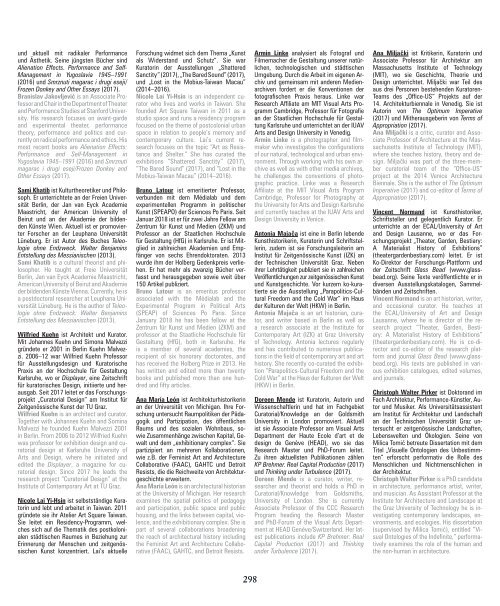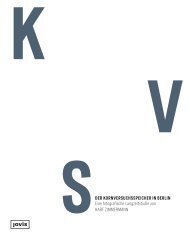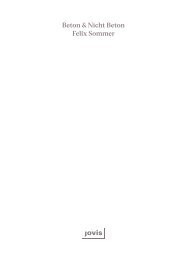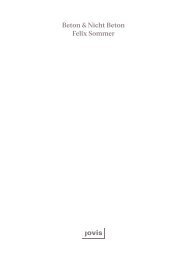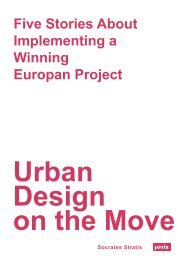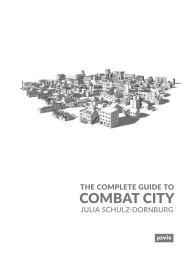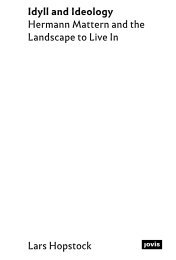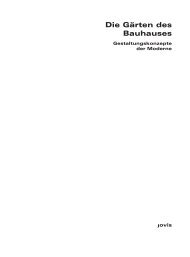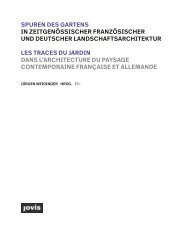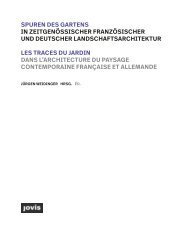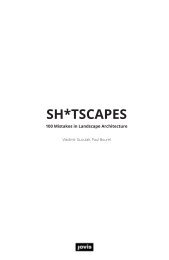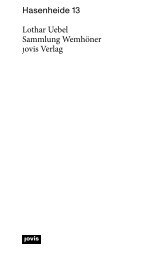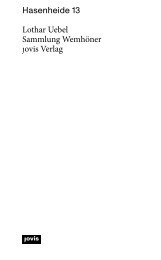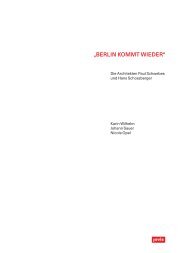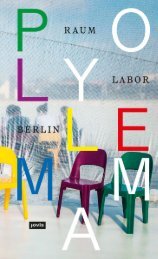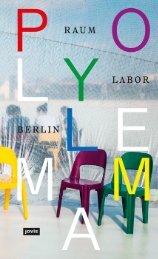Exhibiting Matters
ISBN 978-3-86859-854-4
ISBN 978-3-86859-854-4
You also want an ePaper? Increase the reach of your titles
YUMPU automatically turns print PDFs into web optimized ePapers that Google loves.
und aktuell mit radikaler Performance<br />
und Ästhetik. Seine jüngsten Bücher sind<br />
Alienation Effects. Performance and Self-<br />
Management in Yugoslavia 1945–1991<br />
(2016) und Smrznuti magarac i drugi eseji/<br />
Frozen Donkey and Other Essays (2017).<br />
Branislav Jakovljević is an Associate Professor<br />
and Chair in the Department of Theater<br />
and Performance Studies at Stanford University.<br />
His research focuses on avant-garde<br />
and experimental theater, performance<br />
theory, performance and politics and currently<br />
on radical performance and ethics. His<br />
most recent books are Alienation Effects:<br />
Performance and Self-Management in<br />
Yugoslavia 1945–1991 (2016) and Smrznuti<br />
magarac i drugi eseji/Frozen Donkey and<br />
Other Essays (2017).<br />
Sami Khatib ist Kulturtheoretiker und Philosoph.<br />
Er unterrichtete an der Freien Universität<br />
Berlin, der Jan van Eyck Academie<br />
Maastricht, der American University of<br />
Beirut und an der Akademie der bildenden<br />
Künste Wien. Aktuell ist er promovierter<br />
Forscher an der Leuphana Universität<br />
Lüneburg. Er ist Autor des Buches Teleologie<br />
ohne Endzweck. Walter Benjamins<br />
Entstellung des Messianischen (2013).<br />
Sami Khatib is a cultural theorist and philosopher.<br />
He taught at Freie Universität<br />
Berlin, Jan van Eyck Academie Maastricht,<br />
American University of Beirut and Akademie<br />
der bildenden Künste Vienna. Currently, he is<br />
a postdoctoral researcher at Leuphana Universität<br />
Lüneburg. He is the author of Teleologie<br />
ohne Endzweck: Walter Benjamins<br />
Entstellung des Messianischen (2013).<br />
Wilfried Kuehn ist Architekt und Kurator.<br />
Mit Johannes Kuehn und Simona Malvezzi<br />
gründete er 2001 in Berlin Kuehn Malvezzi.<br />
2006–12 war Wilfried Kuehn Professor<br />
für Ausstellungsdesign und Kuratorische<br />
Praxis an der Hochschule für Gestaltung<br />
Karlsruhe, wo er Displayer, eine Zeitschrift<br />
für kuratorisches Design, initiierte und herausgab.<br />
Seit 2017 leitet er das Forschungsprojekt<br />
„Curatorial Design“ am Institut für<br />
Zeitgenössische Kunst der TU Graz.<br />
Wilfried Kuehn is an architect and curator.<br />
Together with Johannes Kuehn and Somina<br />
Malvezzi he founded Kuehn Malvezzi 2001<br />
in Berlin. From 2006 to 2012 Wilfried Kuehn<br />
was professor for exhibition design and curatorial<br />
design at Karlsruhe University of<br />
Arts and Design, where he initiated and<br />
edited the Displayer, a magazine for curatorial<br />
design. Since 2017 he leads the<br />
research project “Curatorial Design” at the<br />
Institute of Contemporary Art at TU Graz.<br />
Nicole Lai Yi-Hsin ist selbstständige Kuratorin<br />
und lebt und arbeitet in Taiwan. 2011<br />
gründete sie ihr Atelier Art Square Taiwan.<br />
Sie leitet ein Residency-Programm, welches<br />
sich auf die Thematik des postkolonialen<br />
städtischen Raumes in Beziehung zur<br />
Erinnerung der Menschen und zeitgenössischen<br />
Kunst konzentriert. Lai’s aktuelle<br />
Forschung widmet sich dem Thema „Kunst<br />
als Widerstand und Schutz“. Sie war<br />
Kuratorin der Ausstellungen „Shattered<br />
Sanctity” (2017), „The Bared Sound” (2017),<br />
und „Lost in the Mobius-Taiwan Macau”<br />
(2014–2016).<br />
Nicole Lai Yi-Hsin is an independent curator<br />
who lives and works in Taiwan. She<br />
founded Art Square Taiwan in 2011 as a<br />
studio space and runs a residency program<br />
focused on the theme of postcolonial urban<br />
space in relation to people’s memory and<br />
contemporary culture. Lai’s current research<br />
focuses on the topic “Art as Resistance<br />
and Shelter.” She has curated the<br />
exhibitions “Shattered Sanctity” (2017),<br />
“The Bared Sound” (2017), and “Lost in the<br />
Mobius-Taiwan Macau” (2014–2016).<br />
Bruno Latour ist emeritierter Professor,<br />
verbunden mit dem Médialab und dem<br />
experimentellen Programm in politischer<br />
Kunst (SPEAPO) der Sciences Po Paris. Seit<br />
Januar 2018 ist er für zwei Jahre Fellow am<br />
Zentrum für Kunst und Medien (ZKM) und<br />
Professor an der Staatlichen Hochschule<br />
für Gestaltung (HfG) in Karlsruhe. Er ist Mitglied<br />
in zahlreichen Akademien und Empfänger<br />
von sechs Ehrendoktoraten. 2013<br />
wurde ihm der Holberg Gedenkpreis verliehen.<br />
Er hat mehr als zwanzig Bücher verfasst<br />
und herausgegeben sowie weit über<br />
150 Artikel publiziert.<br />
Bruno Latour is an emeritus professor<br />
associated with the Médialab and the<br />
Experimental Program in Political Arts<br />
(SPEAP) of Sciences Po Paris. Since<br />
January 2018 he has been fellow at the<br />
Zentrum für Kunst und Medien (ZKM) and<br />
professor at the Staatliche Hochschule für<br />
Gestaltung (HfG), both in Karlsruhe. He<br />
is a member of several academies, the<br />
recipient of six honorary doctorates, and<br />
has received the Holberg Prize in 2013. He<br />
has written and edited more than twenty<br />
books and published more than one hundred<br />
and fifty articles.<br />
Ana María León ist Architekturhistorikerin<br />
an der Universität von Michigan. Ihre Forschung<br />
untersucht Raumpolitiken der Pädagogik<br />
und Partizipation, des öffentlichen<br />
Raums und des sozialen Wohnbaus, sowie<br />
Zusammenhänge zwischen Kapital, Gewalt<br />
und dem „exhibitionary complex“. Sie<br />
partizipiert an mehreren Kollaborationen,<br />
wie z.B. der Feminist Art and Architecture<br />
Collaborative (FAAC), GAHTC und Detroit<br />
Resists, die die Reichweite von Architekturgeschichte<br />
erweitern.<br />
Ana María León is an architectural historian<br />
at the University of Michigan. Her research<br />
examines the spatial politics of pedagogy<br />
and participation, public space and public<br />
housing, and the links between capital, violence,<br />
and the exhibitionary complex. She is<br />
part of several collaborations broadening<br />
the reach of architectural history including<br />
the Feminist Art and Architecture Collaborative<br />
(FAAC), GAHTC, and Detroit Resists.<br />
Armin Linke analysiert als Fotograf und<br />
Filmemacher die Gestaltung unserer natürlichen,<br />
technologischen und städtischen<br />
Umgebung. Durch die Arbeit im eigenen Archiv<br />
und gemeinsam mit anderen Medienarchiven<br />
fordert er die Konventionen der<br />
fotografischen Praxis heraus. Linke war<br />
Research Affiliate am MIT Visual Arts Programm<br />
Cambridge, Professor für Fotografie<br />
an der Staatlichen Hochschule für Gestaltung<br />
Karlsruhe und unterrichtet an der IUAV<br />
Arts and Design University in Venedig.<br />
Armin Linke is a photographer and filmmaker<br />
who investigates the configurations<br />
of our natural, technological and urban environment.<br />
Through working with his own archive<br />
as well as with other media archives,<br />
he challenges the conventions of photographic<br />
practice. Linke was a Research<br />
Affiliate at the MIT Visual Arts Program<br />
Cambridge, Professor for Photography at<br />
the University for Arts and Design Karlsruhe<br />
and currently teaches at the IUAV Arts and<br />
Design University in Venice.<br />
Antonia Majača ist eine in Berlin lebende<br />
Kunsthistorikerin, Kuratorin und Schriftstellerin,<br />
zudem ist sie Forschungsleiterin am<br />
Institut für Zeitgenössische Kunst (IZK) an<br />
der Technischen Universität Graz. Neben<br />
ihrer Lehrtätigkeit publiziert sie in zahlreichen<br />
Veröffentlichungen zur zeitgenössischen Kunst<br />
und Kunstgeschichte. Vor kurzem ko-kuratierte<br />
sie die Ausstellung „Parapolitics-Cultural<br />
Freedom and the Cold War“ im Haus<br />
der Kulturen der Welt (HKW) in Berlin.<br />
Antonia Maja ča is an art historian, curator,<br />
and writer based in Berlin as well as<br />
a research associate at the Institute for<br />
Contemporary Art (IZK) at Graz University<br />
of Technology. Antonia lectures regularly<br />
and has contributed to numerous publications<br />
in the field of contemporary art and art<br />
history. She recently co-curated the exhibition<br />
“Parapolitics-Cultural Freedom and the<br />
Cold War” at the Haus der Kulturen der Welt<br />
(HKW) in Berlin.<br />
Doreen Mende ist Kuratorin, Autorin und<br />
Wissenschaftlerin und hat im Fachgebiet<br />
Curatorial/Knowledge an der Goldsmith<br />
University in London promoviert. Aktuell<br />
ist sie Associate Professor am Visual Arts<br />
Department der Haute Ecole d’art et de<br />
design de Genève (HEAD), wo sie das<br />
Research Master und PhD-Forum leitet.<br />
Zu ihren aktuellsten Publikationen zählen<br />
KP Brehmer. Real Capital Production (2017)<br />
und Thinking under Turbulence (2017).<br />
Doreen Mende is a curator, writer, researcher<br />
and theorist and holds a PhD in<br />
Curatorial/Knowledge from Goldsmiths,<br />
University of London. She is currently<br />
Associate Professor of the CCC Research<br />
Program heading the Research Master<br />
and PhD-Forum of the Visual Arts Department<br />
at HEAD Genève/Switzerland. Her latest<br />
publications include KP Brehmer: Real<br />
Capital Production (2017) and Thinking<br />
under Turbulence (2017).<br />
Ana Miljački ist Kritikerin, Kuratorin und<br />
Associate Professor für Architektur am<br />
Massachusetts Institute of Technology<br />
(MIT), wo sie Geschichte, Theorie und<br />
Design unterrichtet. Milja čki war Teil des<br />
aus drei Personen bestehenden Kuratoren-<br />
Teams des „Office-US“ Projekts auf der<br />
14. Architekturbiennale in Venedig. Sie ist<br />
Autorin von The Optimum Imperative<br />
(2017) und Mitherausgeberin von Terms of<br />
Appropriation (2017).<br />
Ana Miljački is a critic, curator and Associate<br />
Professor of Architecture at the Massachusetts<br />
Institute of Technology (MIT),<br />
where she teaches history, theory and design.<br />
Miljački was part of the three-member<br />
curatorial team of the “Office-US”<br />
project at the 2014 Venice Architecture<br />
Biennale. She is the author of The Optimum<br />
Imperative (2017) and co-editor of Terms of<br />
Appropriation (2017).<br />
Vincent Normand ist Kunsthistoriker,<br />
Schriftsteller und gelegentlich Kurator. Er<br />
unterrichte an der ECAL/University of Art<br />
and Design Lausanne, wo er das Forschungsprojekt<br />
„Theater, Garden, Bestiary:<br />
A Materialist History of Exhibitions”<br />
(theatergardenbestiary.com) leitet. Er ist<br />
Ko-Direktor der Forschungs-Plattform und<br />
der Zeitschrift Glass Bead (www.glassbead.org).<br />
Seine Texte veröffentlichte er in<br />
diversen Ausstellungskatalogen, Sammelbänden<br />
und Zeitschriften.<br />
Vincent Normand is an art historian, writer,<br />
and occasional curator. He teaches at<br />
the ECAL/University of Art and Design<br />
Lausanne, where he is director of the research<br />
project “Theater, Garden, Bestiary:<br />
A Materialist History of Exhibitions”<br />
(theatergardenbestiary.com). He is co-director<br />
and co-editor of the research platform<br />
and journal Glass Bead (www.glassbead.org).<br />
His texts are published in various<br />
exhibition catalogues, edited volumes,<br />
and journals.<br />
Christoph Walter Pirker ist Doktorand im<br />
Fach Architektur, Performance-Künstler, Autor<br />
und Musiker. Als Universitätsassistent<br />
am Institut für Architektur und Landschaft<br />
an der Technischen Universität Graz untersucht<br />
er zeitgenössische Landschaften,<br />
Lebenswelten und Ökologien. Seine von<br />
Milica Tomić betreute Dissertation mit dem<br />
Titel „Visuelle Ontologien des Unbestimmten“<br />
erforscht performativ die Rolle des<br />
Menschlichen und Nichtmenschlichen in<br />
der Architektur.<br />
Christoph Walter Pirker is a PhD candidate<br />
in architecture, performance artist, writer,<br />
and musician. As Assistant Professor at the<br />
Institute for Architecture and Landscape at<br />
the Graz University of Technology he is investigating<br />
contemporary landscapes, environments,<br />
and ecologies. His dissertation<br />
(supervised by Milica Tomić), entitled “Visual<br />
Ontologies of the Indefinite,” performatively<br />
examines the role of the human and<br />
the non-human in architecture.<br />
298


